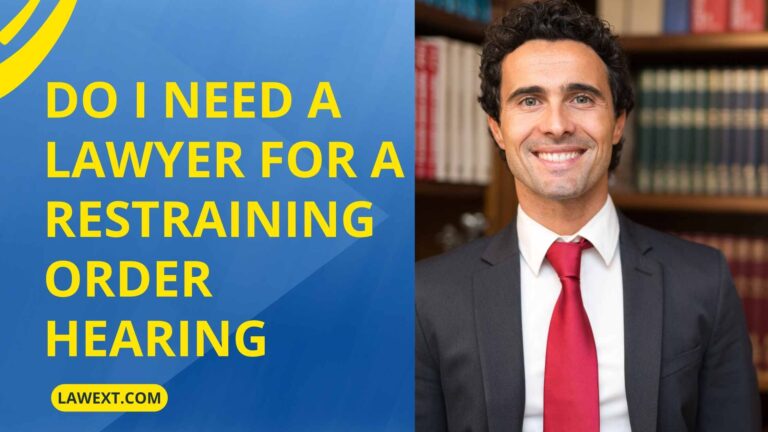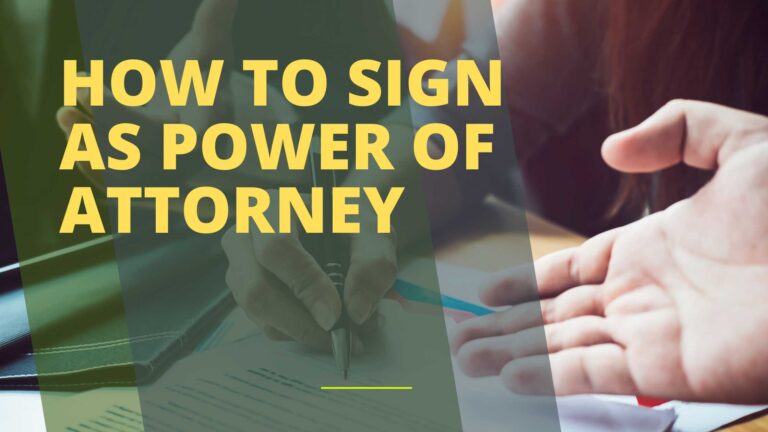Do You Need a Lawyer When Someone Dies?

You do not always need a lawyer when someone dies, but it can be beneficial. Legal expertise helps navigate a deceased person’s estate, especially in complex situations.
Table of Contents
Do You Need a Lawyer When Someone Dies? Dealing with the loss of a loved one can be an emotionally taxing experience, and the legalities involved in settling their affairs add another layer of complexity. A lawyer’s guidance can be crucial when the deceased’s estate includes substantial assets, debts, or potential disputes among beneficiaries.
They help ensure the will’s proper execution and manage any probate processes required by law. With their knowledge of estate laws, lawyers provide peace of mind during a difficult time, handling legal matters with efficiency and tact. Seeking legal counsel might not be mandatory, but it often proves invaluable in resolving estate issues accurately and swiftly.
Confronting Legalities After A Loss
Confronting Legalities After a Loss is a task many may face with unease and confusion. The passing of a loved one not only brings sorrow but also the responsibility of handling their estate. Ensuring legal affairs are in order can be complex. A lawyer’s guidance can be crucial during this time.
The Role Of A Lawyer In Estate Settlement
Dealing with an estate post-loss involves multiple steps. A lawyer can navigate these proceedings, easing the burden on grieving families. They offer expertise in interpreting the deceased’s will and estate laws.
- Confirm the validity of the will
- Identify estate assets and debts
- Manage the dispersion of assets
- Advise on tax implications
- Settle disputes among beneficiaries
Legal professionals ensure compliance with state laws. They can also represent the estate in any litigation.
Probate Process: A Simplified Breakdown
The probate process can intimidate those unfamiliar with legal procedures. A lawyer plays a pivotal role in clarifying and steering the process.
- File a petition with probate court.
- Notify heirs and beneficiaries.
- Inventory and appraise estate property.
- Pay debts and taxes.
- Distribute the remaining estate.
- Close the estate formally.
Each step can involve detailed documentation and deadlines. A probate lawyer will handle these efficiently.

Credit: www.rocketlawyer.com
Assessing The Need For Legal Assistance
Dealing with a loved one’s passing is tough. Legal matters can add to the stress. Deciding whether to hire a lawyer is a crucial step. It ensures the deceased’s estate settles correctly. In this guide, we’ll explore the factors that determine the need for legal advice.
Determining The Complexity Of The Estate
Estates come in all sizes. Complex estates often require an attorney. Simple estates might not. Consider these points:
- Total asset value
- Type of assets involved
- Debts owed by the estate
- Number of beneficiaries
Estates with diverse assets, like businesses or overseas investments, need expert navigation. Clear-cut estates can sometimes be handled without a lawyer.
State Laws And Their Impact On Probate
Probate laws vary by state. Understanding your state’s laws is essential. Here are factors impacted by state laws:
| State Law Factor | Explanation |
|---|---|
| Probate Threshold | Asset value that requires probate |
| Spousal Rights | Surviving spouse’s entitlements |
| Intestacy Rules | Asset division without a will |
| Formal Probate Process | Required court proceedings |
Some states offer simplified proceedings for small estates. Others have a more complex process. Check your local laws or consult a lawyer for guidance.
Estate Planning And Wills
Dealing with the loss of a family member or friend is tough. Legal steps can add to this stress. Estate planning and wills guide what happens to a person’s assets after death. Understanding these processes is key. They ensure the deceased’s wishes are honored. Sometimes, a lawyer helps in executing these wishes.
Executing The Deceased’s Will
A will outlines who gets what from the deceased. It states the executor – a person assigned to carry out these wishes. The executor takes legal steps to distribute assets. This person pays debts, files tax returns, and transfers ownership of property. They often work with a lawyer for guidance and to navigate the law.
- Review the will with care. Understanding directions is critical.
- Gather all necessary documents. This includes bank statements and deeds.
- Communicate with beneficiaries. Keep them in the loop about the process.
Sometimes a will can be simple and straight forward. Often, it is more complex and tricky. This is especially true if the estate is large or there are many beneficiaries. The executor may need a lawyer to manage these complexities.
When There Is No Will: Intestate Succession
If someone dies without a will, it’s called intestate. State laws then decide how assets are divided. This is termed intestate succession. Close relatives usually inherit in a specific order.
| Relationship | Order of Succession |
|---|---|
| Spouse | First |
| Children | Second |
| Parents | Third |
| Siblings | Fourth |
Each state has its own rules. So, the outcome can vary widely. The court appoints an administrator to handle the estate. This can take time and may become complicated. Without a will, the legal process often requires a lawyer’s assistance to ensure fair and legal distribution of assets.
- Learn the intestate laws of your state. Every state’s rules are different.
- Prepare for court proceedings. Working with a lawyer can make this smoother.
- Give reasonable support to the appointed administrator. They play a crucial role in managing the estate.
Whether the deceased left a will or not, navigating post-death formalities can be daunting. Consult a lawyer for guidance. This ensures all are followed properly. Protect your loved one’s legacy and ensure their final wishes are executed with respect and legal compliance.
:max_bytes(150000):strip_icc()/executor.asp-FINAL-ac1672b5696a4c31bea88d39350af626.png)
Credit: www.investopedia.com
Specific Scenarios That Require A Lawyer
When a loved one passes away, handling their affairs can become complex. Certain situations make the guidance of a lawyer not just helpful but essential. Knowing when to seek legal assistance ensures the deceased’s wishes are respected and their estate is appropriately managed. Here are specific scenarios where a lawyer’s expertise becomes critical.
Disputed Claims And Litigation
A contested will or estate leads to disputes that can be difficult to navigate without professional help. Here are key moments when a lawyer is invaluable:
- Challenges to the will: If family members question the will’s validity, a lawyer can defend the estate.
- Disagreements between beneficiaries: Lawyers mediate conflicts and seek resolutions.
- Creditor claims: An estate lawyer can manage debts and prevent unfair claims.
Large Or Unusual Estates
Estates that stand out in value or composition require meticulous handling. Legal expertise is crucial due to:
| Reason | Explanation |
|---|---|
| Tax implications | Professionals help navigate estate taxes, potentially saving money. |
| Complex assets | Lawyers aid in valuing and distributing unique items fairly. |
| Business interests | They provide direction on managing or transferring business assets. |
Cost-benefit Analysis
Conducting a Cost-Benefit Analysis becomes crucial when someone dies. It involves assessing whether hiring a lawyer aligns with the estate’s value and complexity. Families often wonder about the expense of legal guidance during estate settlement. Understanding the potential costs and benefits helps in making an informed decision.
Weighing Attorney Fees Against Estate Value
Attorney fees can vary widely based on the estate’s size and complexity. A simple estate might incur minimal legal fees, while a more complex one could lead to a significant expense. To facilitate this, consider creating a table comparing estate sizes to potential legal fees.
| Estate Value | Potential Legal Fees |
|---|---|
| Under $50,000 | $1,500 – $3,000 |
| $50,000 – $150,000 | $3,000 – $7,000 |
| Over $150,000 | $7,000+ |
Diy Probate: Is It Worth The Risk?
Handling probate without legal help could save fees but carries risks. Mistakes could lead to financial losses or legal complications. Evaluate the following points:
- Understanding of Legal Procedures: Do relatives have the knowledge to navigate probate laws?
- Time Investment: Can someone devote adequate time to manage probate duties?
- Potential for Disputes: Is there a risk of family disagreements that could benefit from a lawyer’s mediation?
- Accuracy: Are there sufficient skills to complete paperwork without errors?
Reflect on these factors before opting for a do-it-yourself approach. The analysis should balance potential savings against the value of professional legal assistance.
Finding The Right Legal Help
Death brings not only grief but also the burden of legal matters. Navigating the complexities of estate settlement and other legal issues requires expertise. Finding a capable lawyer ensures smooth legal proceedings after a loved one passes. This guide helps in the search for the right legal help.
Qualifications To Look For
Seek a lawyer with specific credentials:
- Experience in probate or estate law
- Licensing in your state
- Good standing with the state bar association
- Positive client reviews
Consultations And Making The Right Choice
Most attorneys offer initial meetings at no cost. Use this time wisely:
- Prepare questions about your case
- Assess their communication style
- Determine the fee structure
- Consider the lawyer’s availability
Choose a lawyer who feels like the right partner in this difficult time.

Credit: www.aarp.org
Conclusion
Navigating the aftermath of a loved one’s passing is never simple. Securing a lawyer can streamline the probate process and mitigate potential legal hurdles. Remember, the right legal guidance ensures the deceased’s wishes are respected and their estate is managed justly.
Seeking legal counsel is a prudent step toward honoring their legacy with due diligence.
Amelia Justiceberg, a distinguished legal luminary, thrives on the intersection of empathy and legal acumen. As a prominent family law attorney, she orchestrates compassionate resolutions amidst complex dynamics. Justiceberg's courtroom finesse and dedication to fairness define her practice. Beyond litigation, she ardently advocates for social justice, solidifying her reputation as an influential force in the legal landscape.






